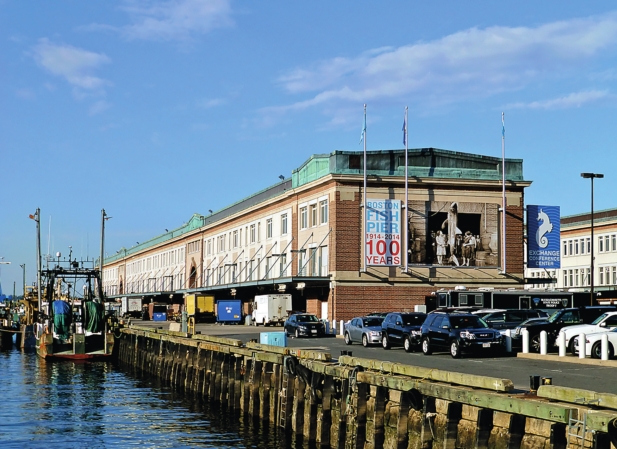

A revived petition to grant landmark status to the Boston Fish Pier at 212-234 Northern Avenue is sparking debate among city officials, preservationists and business stakeholders.
As part of an effort by the Mayor Wu’s Office of Historic Preservation to move through a backlog of community filed petitions that span several decades, a 1995 petition to grant city landmark status to the Massachusetts Port Authority owned Fish Pier has resurfaced.
“The Fish is Pier is also an architectural treasure,” reads the 1995 petition, “a colorful marriage of Georgian simplicity and proportions and solid Romanesque archways and materials. Above the arches are scrolls and likenesses of Neptune, God of the sea. The smaller of the three buildings has decorated concrete pediments with bas relief sculpture of sea motifs.”
The age of the petition and the pier’s existing status as a state-owned property that is already on the National Register of Historic Places has raised some questions about whether another designation is necessary, and how it could affect the area’s growing businesses.
The Seaport’s City Councilor, Ed Flynn, is voicing his opposition both to the potential designation and to how the process has unfolded so far.
“I don't think it’s necessary, Flynn said in an interview. “This is a Massport owned property. It’s a state asset. It’s under regulations and guidelines established over many years by Massport and the process is working well. We don’t need to add another level of bureaucracy from the city government.”
A listing in the National Register of Historic Places puts no restrictions on what a non-federal owner may do with their property, unless the property is involved in a project that receives public funds.
Because the Fish Pier is owned by the Massport, structural changes made by the state already must go through a process dictated by the Massachusetts State Historic Preservation Office. If added to the city landmarks registry, an additional approval process, as determined by a hearing of the Boston Landmarks Commission (BLC), may need to be met.
“The project is expected to appear on the (BLC) agenda this month without any community process or notifications to neighbors or businesses,” Flynn said. “That’s a problem.”
Under the city’s landmarking procedure, once a petition is accepted, a study report is prepared to assess the historical and architectural significance of the property. The report is posted for a 21-day public comment period before a hearing is held. The BLC said in a statement given over email that the study report has been drafted but is not yet publicly available.
If the BLC votes to approve the designation, the decision then moves to the mayor, who has 15 days to respond. If the mayor signs off, or takes no action, the petition proceeds to the City Council for a final vote within 30 days. In January, Boston City Hall was granted landmark status by default, when the City Council failed to hold a vote within that 30-day period following Mayor Wu’s approval.
Flynn contends that city oversight could interfere with the daily operations of businesses that rely on flexibility to maintain facilities and infrastructure. He added that both governors and mayors have long recognized the pier’s economic value and left it largely untouched by broader redevelopment efforts.
“If one of the seafood companies needs to do some work on their building, what impact would a landmark designation have?” Flynn asked. “Those issues are unclear right now, and that’s exactly why a hearing is needed before we move forward.”